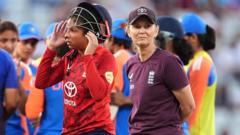Is England's T20 Team Ready for a Summer Showdown?

Understanding England’s T20 Challenges: A Deep Dive into Recent Performances
As the dust settles on a contentious T20 series against India, it becomes painfully clear that the England women's cricket team is navigating a treacherous path in their post-Ashes rebuilding phase. The series, which ended with a 3-2 loss, marked England’s first home T20 defeat against India, resulting in a mix of emotions for players, fans, and analysts alike. Despite a spirited fightback that resulted in a nail-biting win at Edgbaston, the overwhelming sentiment is one of concern and contemplation about the team’s future. This article explores the intricacies of England's recent performances, their strategic challenges, and the implications for the upcoming 50-over World Cup.
The Series Overview: A Study in Dominance and Resilience
England's performance during the T20 series against India was a tale of two contrasting narratives. While India showcased dominance with wins of 97 runs, 24 runs, and six wickets, England’s victories were fraught with tension. Both of England’s wins came from the last ball, illustrating a penchant for drama but also a vulnerability when pressure mounted. The series encapsulated the team’s ongoing struggles, despite moments of brilliance.
Charlotte Edwards, the head coach, acknowledged the challenges ahead, emphasizing the need for patience as England strives to develop their gameplay. "We've still got a long way to go," she stated, subtly reinforcing the idea that the team is still in a phase of transition. However, the reality is that England is not a fledgling squad; they are an experienced team facing a critical juncture in their journey.
Assessing the Transition Phase
Edwards has frequently referred to England as a "team in transition." While this may hold some truth in terms of leadership and team dynamics, it’s essential to recognize the wealth of experience within the squad. The average age of the team is around 27.6 years, with many players having extensive international exposure and franchise experience. This begs the question: Is the transition phase a valid excuse for their inconsistent performances?
Despite the absence of world-class players like Nat Sciver-Brunt and Heather Knight, the team should have the depth and skill to perform better. The squad’s average of 63.9 international caps per player speaks volumes about their experience. The challenge lies not in the experience but in the execution and adaptability of their game plan.
Stumbling Blocks: Playing Spin and Fielding Woes
One of the most pressing concerns for England has been their apparent inability to handle spin bowling effectively. Statistics reveal a troubling trend: in 2022, England averaged 42.3 against spin, losing 25 wickets. This number worsened in 2023, where they lost 46 wickets at an average of just 18. The current series has shown that they continue to struggle, losing 41 wickets at an alarming average of 19.9.
This issue is compounded by a muddled game plan that seems to oscillate between aggressive and defensive strategies when facing spin. Batters find themselves either caught on the crease or dismissed trying to force the pace, leading to predictable outcomes that opponents can exploit.
Another critical area of concern is fielding. Edwards admitted to the team's shortcomings in this department, with several misfields and dropped catches occurring during crucial moments in matches. The third encounter at The Oval highlighted these issues, with four dropped catches in the last five overs alone. Such lapses can cost matches, especially in high-stakes situations.
The Comparison with India: A Case Study in Improvement
India's remarkable improvement in fielding serves as a stark contrast to England’s struggles. The Indian team has embraced a more aggressive fielding strategy, characterized by athleticism and commitment. Players like Radha Yadav have become exemplary fielders, making incredible catches and preventing boundaries, even under pressure. This improvement can be largely attributed to the establishment of the Women's Premier League, which has created a competitive environment and heightened the standards of performance.
England, too, has access to competitive leagues like The Hundred, making it difficult for them to justify their fielding mishaps. The pressure to perform is not a new phenomenon; it’s a staple of international cricket, and teams like Australia have consistently demonstrated that they can thrive under such conditions.
Looking Ahead: The 50-Over World Cup
As the Women’s 50-over World Cup approaches, the window for England to rectify these issues is closing rapidly. With only a tri-series against India and New Zealand scheduled before the World Cup, time is of the essence. This series will be crucial for England to address their weaknesses and solidify their strategies.
Edwards remains optimistic about the team’s potential, but the looming question is whether they can translate that potential into performance on the world stage. The team’s ability to adapt, especially when it comes to playing spin bowling and enhancing their fielding skills, will be pivotal for their success.
Conclusion: A Call for Action
As England gears up for the 50-over World Cup, the focus must shift towards addressing their shortcomings and building on their strengths. The journey may be challenging, but with a proactive approach and a commitment to improvement, there is hope for success. The time for patience is waning, and the results will soon become paramount.
With the cricketing world watching closely, the question remains: Can England overcome their current struggles and rise to the occasion in the World Cup?
FAQs
What are the main areas of concern for the England women's cricket team?
The primary concerns include their inability to play spin effectively and inconsistent fielding performances that have led to dropped catches and misfields during crucial moments.
How has India improved in women's cricket?
India's significant improvements can be attributed to the establishment of the Women's Premier League, which has elevated the standard of competition and fielding, leading to better overall performances on the international stage.
What is the impact of experience on England's T20 performances?
Despite having a more experienced squad, England's performances have been inconsistent, suggesting that experience alone is not enough; execution and adaptability are crucial for success.
In light of these observations, how can England transform their challenges into strengths as they prepare for the upcoming World Cup? #EnglandCricket #WomensCricket #T20Challenges
Published: 2025-07-12 23:48:16 | Category: sport



